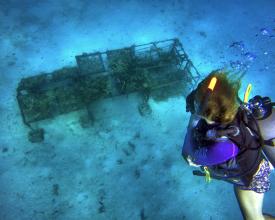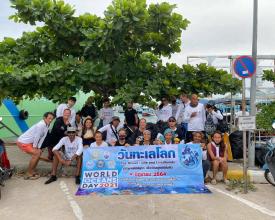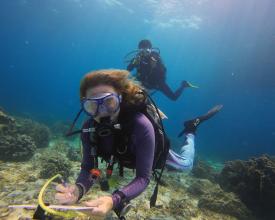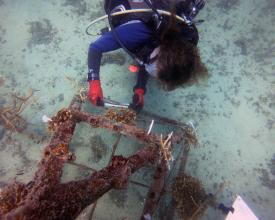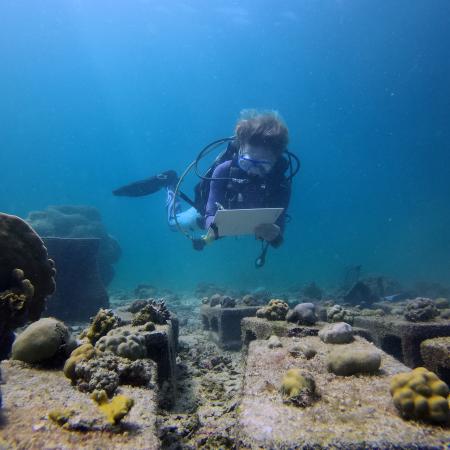
Programa de restauración de corales
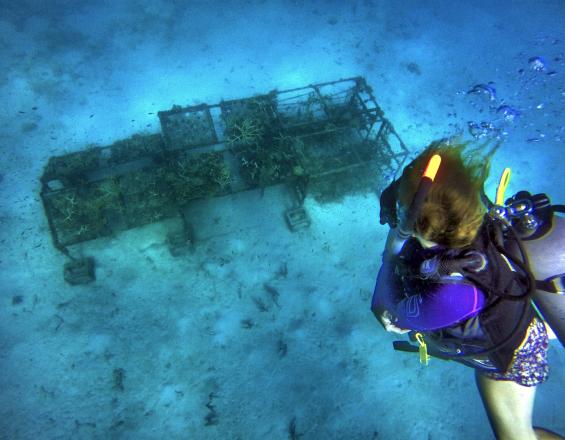
En 2010 iniciamos nuestro primer proceso de restauración de corales con viveros proporcionados por el Departamento de Recursos Marinos y Costeros de Koh Tao (Tailandia). Hemos ampliado la zona a 200 metros cuadrados, construyendo estructuras artificiales para que sirvan de sustrato a los corales que se trasplantarán permanentemente con fragmentos de coral.
Gracias a un seguimiento y mantenimiento a largo plazo, que incluye fotografías y datos de medición, podemos evaluar la salud e investigar las tasas de crecimiento de los corales en distintos entornos.
Contexto
Défis à relever
- Disminución de la salud de los arrecifes de coral que rodean la isla debido a problemas relacionados con el cambio climático, como la acidificación de los océanos y el aumento de la temperatura del mar.
- Prácticas pesqueras perjudiciales debido a la sobrepesca, el uso de redes de arrastre o la falta de regulación de cuotas.
- Anclaje de embarcaciones en arrecifes de coral que causan daños de gran impacto.
- Eliminación inadecuada de basuras arrojándolas por la borda en el mar o en las calles y playas en tierra firme.
Ubicación
Procesar
Resumen del proceso
La combinación de los departamentos gubernamentales y las comunidades locales con nuestros programas de investigación y prácticas sostenibles ayuda a concienciar sobre las amenazas a las que se enfrenta el ecosistema marino y cómo les afectará en el futuro. Al concienciar a la comunidad local y a las partes interesadas sobre el ecosistema del arrecife y educarles sobre cómo nuestros comportamientos pueden afectar a la salud del océano, aprenden a comprender la importancia de mantenerlo sano (Bloque de construcción 1).
Implicar al gobierno para que apruebe nuestras prácticas nos permite llevar a cabo nuestras actividades de restauración sin problemas legales (Bloque de construcción 2). Con la restauración del coral (Bloque 3) y otras actividades marinas también ayudamos a mejorar la población de peces, ya que los alevines utilizan los arrecifes de coral como protección.
Con nuestro enfoque holístico, que abarca todos los aspectos que afectan al ecosistema marino, ayudamos a la comunidad local a tener una visión a más largo plazo utilizando prácticas sostenibles para mantener un ecosistema sano para su industria turística y alimentaria.
Bloques de construcción
Sensibilización de las partes interesadas
A través de nuestros actos y acciones comunitarios, la población local y los turistas pueden informarse mejor sobre cómo reducir su impacto en el medio ambiente local.
A través de las redes sociales y las actividades de divulgación, hemos conseguido que las partes interesadas comprendan mejor la necesidad de cuidar su medio ambiente a largo plazo, ya que su economía depende en gran medida de él.
Factores facilitadores
- Comunicación
- Educación
- Divulgación
Lección aprendida
Es importante darse cuenta de que las acciones de las partes interesadas no cambiarán de la noche a la mañana. Las relaciones deben forjarse a lo largo del tiempo y hay que reconocer que comprenden sus métodos tradicionales de actividades oceánicas.
Mostrar a los interesados locales prácticas mejores y gratuitas les da la oportunidad de ver que el cambio no tiene por qué afectarles económicamente.
Aprobación gubernamental
Algunos de nuestros programas incluyen el trasplante de corales. En Tailandia es ilegal tocar o dañar el coral, así que tuvimos que pedir aprobación para algunos de nuestros programas.
Para recibir la aprobación del gobierno hay que presentar primero una propuesta de zona de restauración de arrecifes de coral. Esta propuesta incluye las técnicas de trasplante, las personas implicadas y su experiencia y cualificación, y un plan a largo plazo de vigilancia y mantenimiento.
El DMCR ha aprobado plenamente nuestras actividades relacionadas con la restauración y nosotros realizamos investigaciones sobre los trasplantes y les proporcionamos esos datos.
Factores facilitadores
- Experiencia en restauración de corales
- Plan a largo plazo
- Propuesta al gobierno
- Evaluación y aprobación
Lección aprendida
El proceso de aprobación es largo. Poder demostrar que nuestros programas tienen éxito y ser evaluados y aprobados llevó más de 2 años de comunicación, presentaciones y evaluaciones.
Para poder obtener el permiso se necesita un grupo de voluntarios comprometidos que tengan experiencia relevante y estén dispuestos a participar en el programa durante un periodo de tiempo prolongado.
Restauración de corales
Sólo las personas autorizadas por el gobierno están autorizadas a realizar estas actividades; sin embargo, en la restauración del coral participan buceadores y no buceadores no autorizados para ayudar en tareas de mantenimiento que no implican la recogida o el trasplante de fragmentos de coral (como la limpieza de marcas de coral, etc.).
Los fragmentos de coral se recogen en el borde del arrecife. Una vez recogidos, se trasplantan a estructuras artificiales para ayudar a aumentar la diversidad y la población de corales.
Algunos corales se adoptan como parte de nuestro programa Adopte un coral, se trasplantan y se les da un nombre, y después se controlan, fotografían y miden cada tres meses. Los datos se publican en línea y están disponibles gratuitamente para la investigación sobre el crecimiento de los corales. Este programa también ayuda a obtener datos sobre el crecimiento y el estado de salud de los corales.
Factores facilitadores
- Aprobación gubernamental
- Redes sociales
- Personas comprometidas con el medio ambiente
- Logística (submarinismo, barcos de buceo)
Lección aprendida
El proceso de trasplante en sí es bastante sencillo. Otros factores que no tuvimos en cuenta inicialmente son el tiempo necesario para mantener las zonas limpias de organismos incrustantes, recopilar datos de medición y registros fotográficos de los corales. Todo el mantenimiento posterior es de vital importancia para garantizar una alta tasa de supervivencia de los trasplantes de coral.
Impactos
Cambiar las prácticas pesqueras, el anclaje de los barcos y el vertido de basuras hacia un proceso más sostenible también contribuye a mantener el arrecife más sano.
- Aumentar la concienciación a nivel local y gubernamental.
- Nuevas zonas para la restauración del coral.
- Conocimientos compartidos para aumentar la investigación.
- Aumento de las leyes de protección.
Nuestro programa Adopta un Coral comenzó en 2016, permitiendo a buceadores y no buceadores aprender y contribuir a nuestros esfuerzos de restauración de corales. Todos los datos que recopilamos del programa se publican en línea y están disponibles gratuitamente para la investigación sobre el crecimiento de los corales.
Mediante la restauración del coral y otras actividades marinas también ayudamos a mejorar la población de peces, ya que los peces jóvenes utilizan los arrecifes de coral como protección.
Beneficiarios
- Los turistas se benefician de una mejor calidad del buceo.
- La comunidad local mejora económicamente a largo plazo.
Historia

Cuando llegamos a la isla de Koh Tao en 2009 para completar nuestros estudios de buceo profesional, pronto vimos la necesidad de crear un grupo centrado en el medio ambiente. Uniéndonos a otros para crear una organización de conservación marina, empezamos a buscar formas de ayudar a los degradados y maltratados arrecifes de coral de la isla.
Empezamos a crear programas para educar e implicar a los turistas y a la comunidad local, para mostrarles que había formas alternativas de hacer las cosas que mejorarían el ecosistema y serían económicamente beneficiosas para ellos. Empezamos con objetivos muy pequeños, como una campaña para prohibir los plásticos de un solo uso, limpiezas de playas y una pequeña zona de investigación bajo el agua donde poder investigar el crecimiento de los corales. Hoy, esta zona se ha ampliado a un área de 200 m2 totalmente aprobada por el Departamento de Recursos Marinos y Costeros.
Nuestro programa Adopta un Coral comenzó en 2016, donde buceadores y no buceadores podían contribuir a la restauración del coral financiando parcialmente el proceso de trasplante de coral. Realizamos estudios periódicos de todos los corales adoptados, con mediciones y fotografías publicadas en línea cada 3 meses. Compartir conocimientos con otras organizaciones afines ha hecho que muchas zonas de la isla se zonifiquen con fines de restauración y que se regule la pesca y el fondeo, y colaboramos en grandes proyectos con el gobierno para seguir aplicando cambios que mejoren el ecosistema.
Ahora que la comunidad es más consciente de los efectos medioambientales, puede contribuir a mejorar la salud de nuestros arrecifes de coral, lo que beneficia a las partes interesadas locales y a la satisfacción del turismo.

